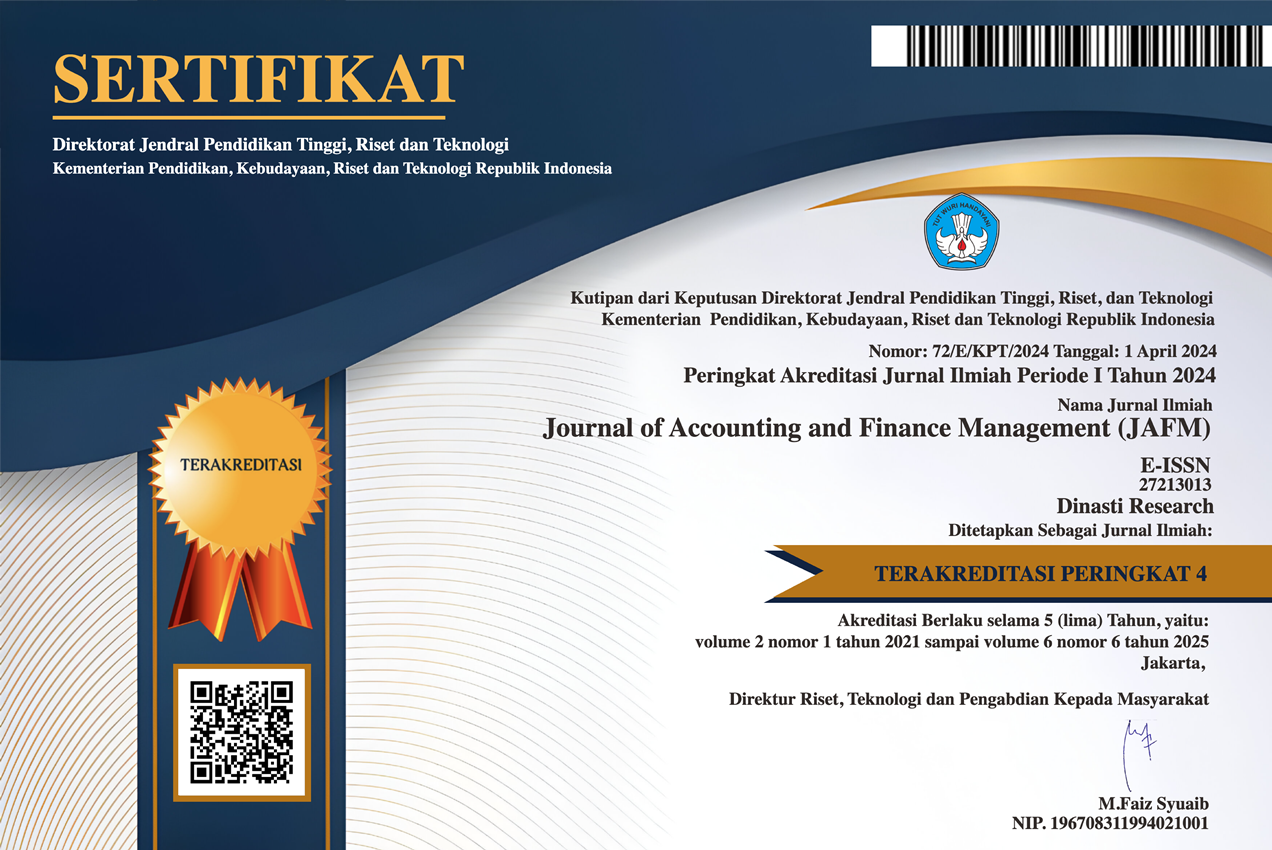The Effect of Single Identity Number Implementation, Tax Service Quality and Taxpayer Awareness on Taxpayer Compliance
DOI:
https://doi.org/10.38035/jafm.v6i2.2092Keywords:
Compliance, Single Identity Number, Service Quality, Taxpayer AwarenessAbstract
Taxes serve as a means for enforcing or overseeing government policies related to social and economic issues. This inquiry focuses on how the method of implementing a unified identity number, the standard of tax services, and taxpayer consciousness affect the adherence levels of individual tax obligors. A quantitative approach is adopted, incorporating firsthand information collected via the distribution of questionnaires. The research focused on single tax filers who are enrolled at KPP Pratama Cirebon Dua. The sample consisted of 60 personal taxpayers, chosen using the saturated sampling method. Findings from this research reveal that the Single Identity Number (SIN) and taxpayer awareness positively and significantly influence tax adherence. Conversely, the standard of aid from tax authorities has an inconsequential and detrimental influence on compliance. Tax subject adherence is shaped by the Single Identity Number (SIN), the caliber of tax services, and the degree of tax remitter’s understanding.
References
Dr. Juliansyah Noor, S, E., M. M. (2011). SKRIPSI, TESIS, DISERTASI & KARYA ILMIAH (7th ed.).
Ferdian, T. (2025). Lapor SPT Dulu, Jangan Tunggu Ramadan Berlalu. DJP.
Hermianti, Lukman Hakim, & Rosdianti Razak. (2022). Pengaruh Kualitas Pelayanan Terhadap Kepatuhan Wajib Pajak pada Kantor Pelayanan Pajak Pratama Makassar Selatan. Journal Kajian Ilmiah Mahasiswa Administrasi Publik (KIMAP), 3(6), 1901–1012.
Kementerian Keuangan Republik Indonesia. (2024). Tantangan dan Strategi Pemerintah Capai Target Penerimaan Pajak 2025. KEMENKEU.
Maharani, A. P. (2024). Approved: 04-09-2024. 2(1).
Mahardika, V. A. (2024). Inovasi Teknologi Demi Kemudahan Layanan Pajak. DJP.
Munazat, A. (2025). Shortfall, Realisasi Penerimaan Pajak 2024 Hanya Capai 97,2% dari Target. MUC Consulting.
Nurjanah, R. M. (2024). DJP Tegaskan Data Wajib Pajak Aman, Tidak Terindikasi Bocor. MUC Konsulting.
Riyanto, S., & Hatmawan, A. A. (2020). Metode Riset Penelitian Kuantitatif Penelitian Di Bidang Manajemen, Teknik, Pendidikan, dan Eksperimen. In Deepublish (p. 373).
Rochmat Aldy Purnomo, S.E., M. S. (2016). ANALISIS STATISTIK EKONOMI DAN BISNIS DENGAN SPSS (1st ed.).
Sahir, S. H. (2022). Metode Penelitian. KBM Indonesia.
Siregar, D. L. (2020). Pengaruh Kesadaran Wajib Pajak, Sanksi Pajak Dan Pelayanan Pajak Terhadap Kepatuhan Wajib Pajak Orang Pribadi Pada Kantor Pelayanan Pajak Pratama Cileungsi, Kabupaten Bogor. Economicus, 14(2), 180–190. https://doi.org/10.47860/economicus.v14i2.196
Sugiyono. (2019). Metode penelitian kuantitatif kualitatif dan R dan D / Sugiyono.
Sugiyono, P. D. (2012). METODE PENELITIAN KUANTITATIF, KUALITATIF DAN R&D (19th ed.). Alfabeta, CV.
Wulandari, M. (2023). Pelaporan SPT Tahunan OP 2023 Meningkat, Tumbuh Hingga 3,31%. Pajakku.
Zaini Miftach. (2023). Buku Ajar Metode Penelitian. CV Science Techno Direct.
Zainul, A. (2025). Langkah Besar Dalam Modernisasi Pajak di Indonesia. Kumparan.
Downloads
Published
How to Cite
Issue
Section
License
Copyright (c) 2025 Sri Rahayu Lestari, Maria Rissa Rizky Rahmawati, Azra Aulia, Dev Anand

This work is licensed under a Creative Commons Attribution 4.0 International License.
Authors who publish their manuscripts in this journal agree to the following conditions:
- The copyright on each article belongs to the author(s).
- The author acknowledges that the Journal of Accounting and Finance Management (JAFM) has the right to be the first to publish with a Creative Commons Attribution 4.0 International license (Attribution 4.0 International (CC BY 4.0).
- Authors can submit articles separately, arrange for the non-exclusive distribution of manuscripts that have been published in this journal into other versions (e.g., sent to the author's institutional repository, publication into books, etc.), by acknowledging that the manuscript has been published for the first time in the Journal of Accounting and Finance Management (JAFM).



























